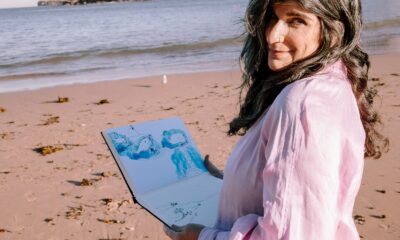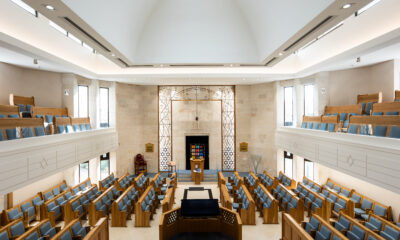
Lifestyle

Prolonged trauma – Holocaust survivors under the spotlight
Dr Tracey Farber, a psychologist who specialises in working with trauma, was involved in the creation of the book Catastrophic Grief, Trauma, and Resilience in Child Concentration Camp Survivors. The SA Jewish Report spoke to her.
What drew you to writing the book?
After I completed my research, I felt that the testimony/data that I was able to get from Holocaust survivors was so important, I wanted to share stories of survival. Most of the children interned in concentration camps didn’t survive, therefore their stories form a unique and important fabric in the Jewish story of survival.
What research did you do and how did you do it?
The book is an adaption of my PhD research awarded in 2019 in the department of psychology at the University of the Witwatersrand (Wits). My coauthors are the two professors who supervised the research, Professor Emeritus Gillian Eagle and Professor Cora Smith. I wrote some chapters alone, we wrote some together, and they each added unique chapters that underscored the relevance of the research.
I interviewed nine aging survivors who were interned in concentration camps during their childhoods or adolescence. This book tells the story of each survivor.
What was your process in interviewing survivors?
First, the questionnaires had to be approved by the Wits ethics committee, each survivor signed written consent, and the research was anonymous. Holocaust survivor Don Krausz assisted me by helping with the questionnaire, and suggested that I contact survivors who were under the age of 18 at the end of the Holocaust. I did all the interviewing, and 74 hours of testimony was recorded from the nine survivors interviewed. We looked at early attachment to parents and siblings before the Shoah, including their lives in their communities in Europe. Each participant then described their experience of being in the concentration camps, including the loss of parents and siblings. Liberation was different for each child survivor, and each of them described how they arrived in South Africa and their period of adjustment after the Shoah. The participants were all aged when they participated in the research, and were able to offer a retrospective view of loss and trauma, including resilience and capacity for meaning making.
I used the results of the PhD to approach Johannesburg Jewish Community Services to set up a psychosocial service for aging Holocaust survivors. This service at the Chevrah Kadisha was supported by Jeff Shankman, who funded it, and it continues today.
How did the children’s ages during internment impact on their resilience and ability to carry trauma, if at all?
The younger the age of separation from parents, the more the impact of loss and developmental disruption, however, every developmental stage carries its own level of vulnerability to trauma. Resilience is established in the quality of secure parental attachment before the Holocaust.
What would you say, looking back, were the biggest insights you got working with survivors?
After several decades, survivors still felt catastrophic grief for the parents that they had lost during the Shoah. All survivors had trauma symptoms, and they still wanted their stories to be heard.
What were the most concerning things you learned?
Decades later, Holocaust survivors were still suffering from post-traumatic stress disorder or PTSD symptoms, even resilient, “high functioning” survivors. In addition, some also suffered from depression. Our research coined the term “trauma trilogy”, which described the catastrophic grief, anger, and survivor guilt that they carried as a result of their parental and family losses. This stayed with them, and often lead to a sense of despair and existential loneliness.
How does the trauma you witnessed in working with Holocaust survivors differ from that you have seen with others?
For Holocaust survivors, the loss and trauma were sustained over a five-year period, and it was prolonged and intense.
Looking at 7 October, how can people recover from what happened?
It’s difficult to talk about recovery when the war is ongoing and victims of 7 October have been subjected to continuous traumatic stress. At best, resilient survivors are able to reach a point after significant amount of therapy where they are able to live productive lives in parallel to their trauma. We know that social support and a sense of hope and meaning helps people to recover.
Looking at the child survivors of the 7 October massacre, how would you be able to help them and those around them?
It’s critical that child survivors receive social support from their families, friends, and communities. Social support lessens their sense of aloneness in the world. Mental-health services, psychotherapy, and group therapy are critical in helping them to process the trauma that they experienced on an extreme scale. In addition, psycho-education has an important role helping survivors understand their trauma and build coping skills.
Looking at the world’s reaction to 7 October and the war against Hamas, what insight can you give us?
The massacre of 7 October was indeed horrifying – the worst massacre of Jews since the Shoah. As Jews were facing the death and atrocities committed by Hamas, they were hit by antisemitism by the international community which defended Hamas. This was a deep betrayal, as there was no empathy for the suffering and brutality we endured. The rise in antisemitism has rekindled many old historical fears of persecution and fear of annihilation.
What have you learned about resilience? How would it impact the way Jews around the world and in Israel have dealt with 7 October?
Resilience is the capacity to walk forward in the face of trauma, and to hold onto a sense of hope and goodness in the world. This is extremely difficult in the midst of ongoing trauma. We know that Jews are capable of inordinate strength and creativity, and the capacity to build and rebuild. The Hebrew word “beyachad” (together) is important. In many communities, solidarity and social support has given people a sense of hope and meaning.
Have your ideas about resilience changed over this time? If so, how and why?
What the research underscored is the profound role secure attachment – between parent and child – plays in developing resilience.
Will the survivors’ trauma have an impact over generations?
This book focuses on Holocaust survivors and not the second generation. However, we know that the second generation is easily triggered by the current war, and the damage will be felt over generations.
What impact has it had on the Jewish world since 7 October?
Since 10 October, Israel and the Jewish world are in a state of “prolonged traumatic stress”. This describes a sense of ongoing trauma from the past and present with no definite end in sight. We have 122 hostages that are still in captivity, and we have lost many lives in the brutal attack on 7 October as well as many soldiers. Jews feel deeply upset about the attack on their spiritual homeland and their existential right to exist. In addition, many Jews living in the diaspora feel hurt and betrayed by the antisemitism that has emerged in their communities. Many feel a sense of conflict – empathy for the losses on the other side and the same time, a sense of anger and fear of further attack. From my research, I learned that empathy heals, and it’s an important Jewish value. In the midst of our trauma, we have to fight for our empathy as the ongoing cycle of anger and revenge is dangerous and leads to further damage.
Who would you most like to read this book?
Psychologists, social workers, and mental-health workers interested in trauma should read it. Also, anyone interested in the Holocaust.
- Clinical psychologist Dr Tracey Farber lives in Tel Aviv. She works at Tel Aviv University Psychological Services and in private practice.











Frank Giron
August 12, 2024 at 4:53 pm
Tracey and her colleagues have done an incredible service to the Israeli people as well as world Jewry by outlying in simplistic terminology the essence of trauma in both the Shoah and most important for us, October 7th. Her observances and advice should be headed in the healing methodology of bringing back self confidence to Israelis and Jews who are suffering multiple doubts about our future today. Thank you Tracey